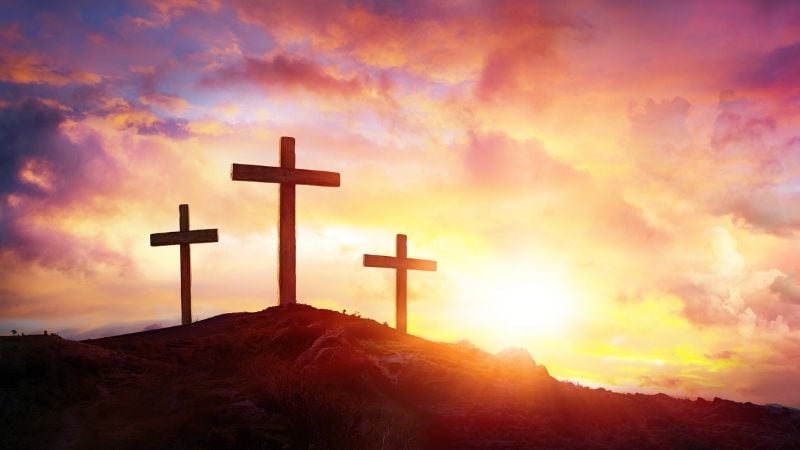There is scholarly debate about the order of the seven statements Christ made while on the cross, and about the accuracy of grouping the original seven (one is less confirmed between the synoptic Gospels), but I'll take the traditional grouping as it is traditionally presented and provide a comment for each.
1. Father, forgive them, for they know not what they do. (Luke 23:34)
Context is everything, but here, there's not enough. It's hard to tell whether the Lord was singling out the Roman soldiers carrying out the tortuous duties of the crucifixion without a clue as to the Jewish prophecies of a Messiah, or whether His intention was to broader addressees. What's clear, however, is that even as the victim of barbarous cruelties, this Lord is a merciful one. And that mercy extends to all of us. While it's true that more knowledge requires more responsibility, I doubt even the closest, most erudite, and most intimately familiar disciples of Jesus could comprehend the full significance of the crucifixion. The point is that all of us are in the same position of ignorance, compared to our Lord. He alone knew and passed below the sin and suffering of us all--felt the full eternal weight of our wrongs, and their consequences upon others--and He still offers us advocacy with the Father.
2. To day shalt thou be with me in paradise (Luke 23:43)
Unless you believe that Christ was a liar, this verse should be sufficient to altar the common Christian misconception that the scriptural term Paradise is synonymous with the concept of Heaven. Three days after this statement, Christ returned--a glorified and resurrected Being--but made sure to include the detail that He had not yet ascended to His Father. Paradise is therefore not where God resides, but is, instead a waiting space for eternal spirits to await their resurrection. Those awaiting a felicitous judgment have a preview of the peace and joy that will be eternally theirs after judgment day, and that is where the spirit of the repentant thief to whom Christ was individually speaking joined his Lord's spirit. But it takes no belief in Joseph Smith, or the Book of Mormon to deduce that the broader Christian world's simplistic conception of Paradise as a place of instant final judgment at the time of death is not entirely accurate. And it speaks to the Lord's persistence in acting for the benefit of others--extending mercy--even while under extreme duress. He can change our state just as instantly: from sinful to enlightened.
3. Woman, behold thy son...behold thy mother (John 19:26-27)
In what is commonly seen as a passing on of familial responsibilities at the point of death, Jesus gestured to his disciple John, and let his mother know that he would be looking after her from this point forward. Her need, seeing her divine, and yet also biological Son suffering on the cross, was great at the time. From the moment the angel Gabriel informed her of the pregnancy she was blessed to carry out, Mary had pondered in her heart the meaning of her Son and His mission. But while the intellect can comprehend a concept, a parent is never more pained as when watching their beloved child suffering. Jesus was in the middle of an infinite atonement, the pain of which all language is inadequate to describe, and yet He wanted to comfort his mother in the immediacy of her need. He sees our need as well, and comforts us in our affliction.
4. I thirst (John 19:28)
Far from the control leak that this expression of physical discomfort seems to betray on the surface, John takes great pains to show us the context of this utterance. It wasn't an indulgence of the body, but instead an intentional trigger for the soldiers there to fulfill prophecy that He knew, but they didn't. Not to indulge the vulgarity of the Romans' brutality too much, but the sponge they filled with vinegar likely came from their field kits--the equivalent of our modern-day toilet paper. And by predicting that level of cruelty as a response when he shared his physical state and implied that they should supply Him at least the most basic dignity of water, He who had gone without water for 40 days on prior occasions, had maneuvered them into compliance with a thousand year old Psalm (69:21). The sign of vinegar given for drink to the Messiah could have supplied anyone in attendance who had sung it (and there were many who must have) with more evidence of His divinity, and their need for His living water.
5. Eloi, Eloi, Lama Sabachthani! (Matt 27:46)
Even stronger than the last reference to a Psalm while on the cross, was Jesus's choice to cry out not in Hebrew, not in Latin, not in Greek, but in Aramaic, the lingua franca of the majority of the people present was a teachable moment connecting worshipers to evidence of His role as Messiah. As His crucifixion robbed his body of vital fluids and left Him with an unquenchable thirst, so His heart was strained with the necessity of carrying parts of His atoning burden alone. "I thirst" had a deeper significance in its connection to a Psalm, but did express on the surface exactly what He was feeling. In the same way, the interpretation Matthew shares after transliterating the Aramaic for his readership conveys faithfully the most human moment our Lord ever endured--He who so alone merited the constant companionship of His Father and His Spirit was left unjustly abandoned so the atoning work could be complete. Knowing how exquisite that solitude felt, His pledge is to never leave us alone. But, again, on another level, the choice to use Aramaic was also significant. Jews of all kinds, with training in the ancient Hebrew of the scriptures, or commoners whose familiarity was only with the translated version--the Targum--could not have failed to recognize the first line of Psalm 22 in the same way no modern person familiar with Christmas carols could fail to complete the line with the words "let earth receive her king!" when the words "Joy to the world, the Lord is come" are uttered. And what are the contents of Psalm 22? That Messianic psalm refers to a casting of lots for raiment that had just happened, mocking words which had just happened, and a piercing of hands and feet which had just happened. Perhaps even to the very Pharisees who had called for His torture and death at the hands of Pilate's legions were being given one last chance to recognize Him for who He really was--the fulfillment of prophecy, the Messiah who atoned for sin--and to let that recognition turn them to repentance. Here again, surface and second-level contexts validate both His ability to understand us, and to save us from sin and eternal suffering.
6. Father, into thy hands I commend my spirit (Luke 23:46)
Using all but three of His last words in prayer, Jesus modeled to the end a pattern of obedience despite hardship and a submission to His Father who acts only ever out of love for His children. He was submissive to no Roman or earthly authority. He demonstrated submission not even to His own body, heart, and mind's needs, appetites, and compulsions. He didn't even choose to use the power of His own divinity for His own relief, and instead, to the dregs, drank the cup the Father required of Him, commending to the Father not only His spirit, but the glory of a plan fulfilled, of salvation made available to all. How much more need have we, then, of accepting the Father's will that we leave behind the sins and suffering that burdens us and cast it upon our great Redeemer. He paid the price so we wouldn't have to.
7. It is finished (John 19:30)
I don't think any human can fully imagine the sense Jesus must have become aware of as His Atoning sacrifice was drawing to a close that there was a chronological point of termination impending that sparked this utterance. Whatever triggered his perception of the end, He could have kept it to Himself, but instead chose to share so we could know what the example was. Like all of the previous utterances, the vocalizations were not for His own benefit, but ours. What we should keep in mind that the term "finished" was recorded in the Greek of the New Testament with the same word we now use to indicate flawlessness, but which at the time meant completion: perfect. As His model implies, we too must endure to the end, complete the work the Father gives us, and hold fast to the iron rod of scripture. He was all-in, committed to the end, and fulfilled His purpose of becoming--becoming the atoning Lamb of God--and we must make that sacrifice meaningful in our own lives by emulating His all-in-ness with Him. He commanded the listeners to His Sermon on the Mount to be perfect (there's that word again!) even as His Father was perfect. He commanded the Nephites, Lamanites, and Mulekites in attendance at the temple at Bountiful when He re-delivered that Sermon to be perfect even as He and His Father were perfect. Partnering with Him is what completes us. Giving Him our sin, is what covers our flaws, and gives us new life. Walking with Him--whose mission was not complete even if His atoning sacrifice was--means we must endure life's challenges, but with Him taking our failures upon Him, our walk of faith assures our own blessing and the blessing of all who hear our testimony, in whatever manner we share it.
Easter time means reverent reflection, for me. I hope thinking about what He said on the cross is helpful in your own effort to emulate Him.


No comments:
Post a Comment